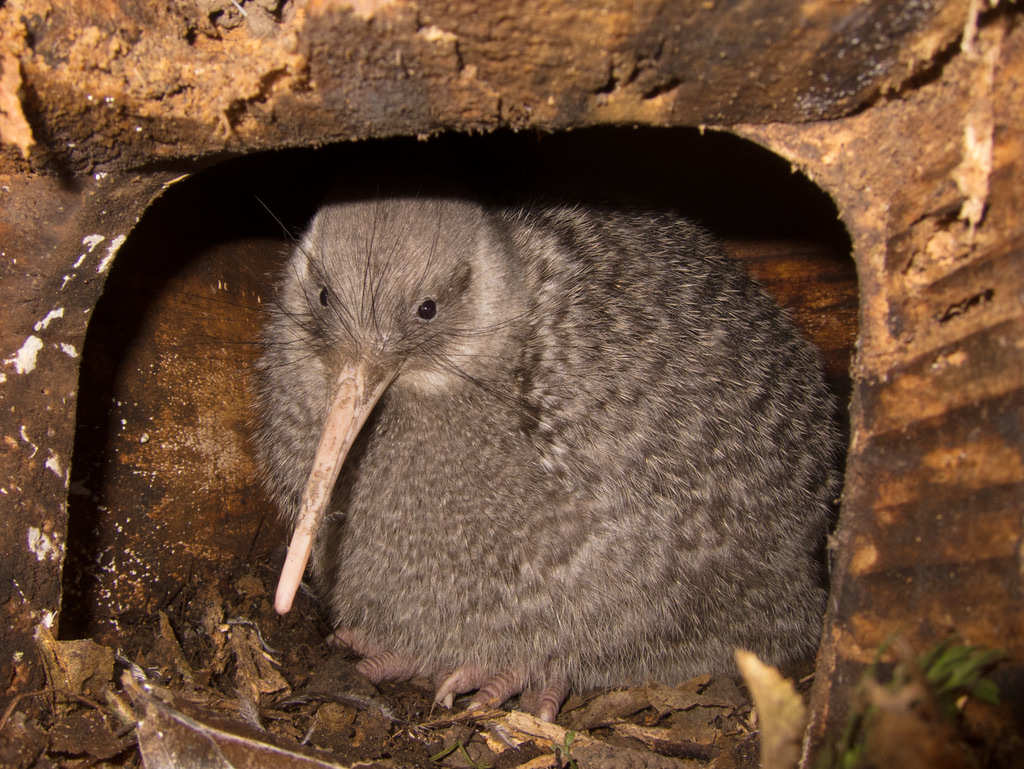A big return for little kiwis


Kiwi pukupuku (little spotted kiwi) are returning to Nelson. Photo: Andrew Digby.
After almost a 100-year absence from the Top of the South, kiwi pukupuku (little spotted kiwi) are returning to Nelson next month.
Approximately 40 kiwi pukupuku are being translocated into the Brook Waimārama Sanctuary from their Kapiti Island breeding ground in early May.
This marks the first attempt to re-establish the species on the mainland of the South Island.
The project is a partnership with Te Rūnanga o Toa Rangatira whose interests encompass both sides of the Cook Strait, Te Tauihu (Top of the South) iwi, the sanctuary, Save the Kiwi, and the Department of Conservation.
Together with its larger relations, the great spotted kiwi and rowi, the kiwi pukupuku used to roam the Nelson area before all three species became locally extinct after the arrival of introduced predators.
Matt Hippolite from Te Rūnanga o Toa Rangatira says the iwi is proud of the role Kapiti Island has been able to play in bringing the species back from the brink of extinction.
“Kapiti Island is a special place that has enabled kiwi pukupuku and other taonga species to thrive. For Te Rūnanga o Toa Rangatira, it has been an honour to be the kaitiaki of these manu, as their population recovers to a point to start returning them to their whenua.”
Turi Hippolite from Ngāti Koata says welcoming little spotted kiwi back to the South Island will be a “momentous occasion”.
“Te Waipounamu is the traditional home for kiwi pukupuku so being the first region to welcome them back to their whenua in almost a century is a privilege.”
Save the Kiwi chief executive Michelle Impey says it is “incredibly important” to see kiwi pukupuku being returned to the region.
“It was believed that kiwi pukupuku were gone from most parts of the South Island by the 1930s, so it is a significant conservation milestone to be able to return them to the Nelson area.”
Bringing kiwi to the sanctuary follows the reintroduction of tuatara, kākāriki karaka, and powelliphanta in recent years.
Sanctuary ecologist Robert Schadewinkel says being able to welcome the species is an “incredible privilege”.
“The sanctuary team is very excited to be able to reintroduce kiwi pukupuku to the region as part of our ecosystem efforts and visitor experience offering, after so many years in the planning.
“Translocating the threatened kiwi pukupuku is vitally important in helping to sustain and grow their population, and it has to be done extremely carefully to ensure their safety. It has been great to work with the experts at Save the Kiwi, who have considerable translocation experience.
“This project was the vision of the original founders of the sanctuary and marks 20 years made up of thousands of hours of volunteers and staff - past and present - who have created the environment in which kiwi can once again thrive in Nelson.”

An experienced and accredited kiwi handler and translocation practitioner will oversee all aspects of the operation, including catching and preparing birds on Kāpiti Island for translocation.
In accordance with Wildlife Authority permit requirements, the team will undertake various tasks such as banding/microchipping birds, conducting health checks, and collecting samples for disease screening.
Factors that contribute to a successful translocation include handling the birds with care, selecting healthy individuals, keeping the birds well-fed and watered, and minimising stress and overheating during transport and release.
The project has had significant support from many people, organisations and businesses, such as Jens Hansen, which set up the Kiwi Establishment Fund in 2022, Save the Kiwi, and Nelson City Council.
Nelson Mayor Nick Smith says the announcement represents a “momentous conservation achievement”.
“I cannot wait to hear the call of the kiwi in our own backyard. It will also be a boost for Nelson’s visitor industry to have kiwi so close to the city and in a natural setting.”
More details about the translocation will be made available soon, but for now, the community can follow the early stages on the sanctuary’s Instagram or Facebook pages and keep an eye out around Nelson for some kiwi-related activity.
